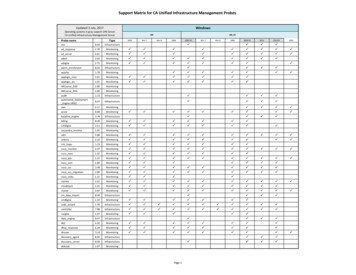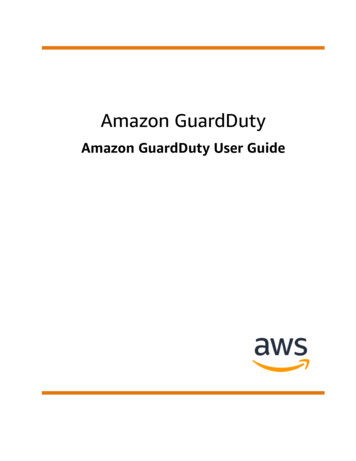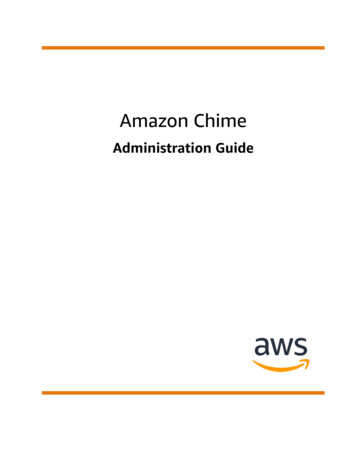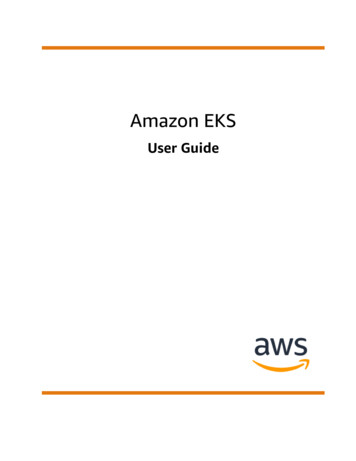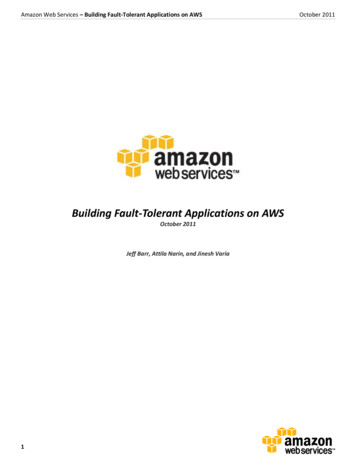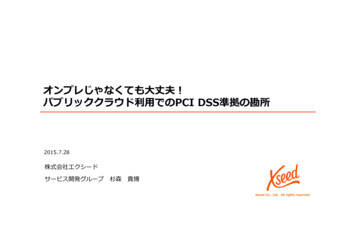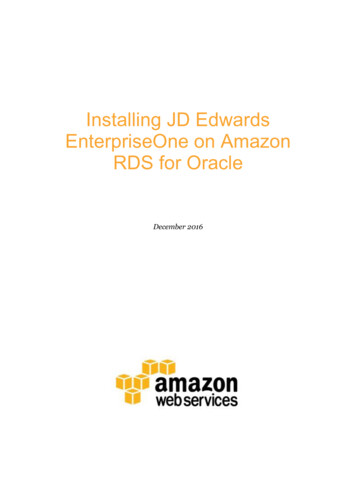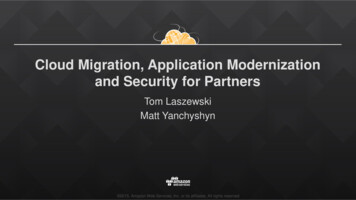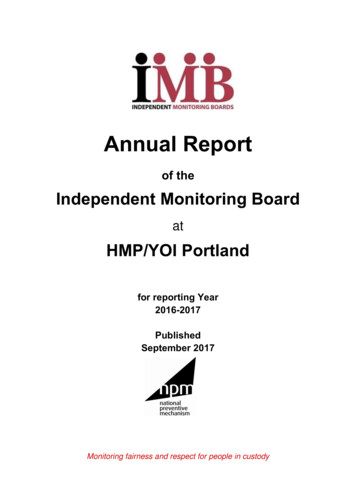
Transcription
Annual Reportof theIndependent Monitoring BoardatHMP/YOI Portlandfor reporting Year2016-2017PublishedSeptember 2017Monitoring fairness and respect for people in custody
TABLE OF CONTENTSIntroductory SectionsSectionTopicPage1Statutory Role32Executive Summary33Description of Establishment9AEvidence Sections4Safety95Equality and Fairness106Segregation/Care and Separation Unit107Accommodation (including communication)128Healthcare (including mental health and social care)149Education and Other Activities1510Work, Vocational Training and Employment1511Resettlement Preparation1612Security17A1The Work of the IMB182Applications to the IMB19BPage 2 of 20
A.Introductory Sections 1 - 31.STATUTORY ROLE OF THE IMBThe Prison Act 1952 requires every prison to be monitored by an independent Boardappointed by the Secretary of State from members of the community in which the prison orcentre is situated.The Board is specifically charged to:(1) satisfy itself as to the humane and just treatment of those held in custody within itsprison and the range and adequacy of the programmes preparing them for release.(2) inform promptly the Secretary of State, or any official to whom he has delegatedauthority as it judges appropriate, any concern it has.(3) report annually to the Secretary of State on how well the prison has met the standardsand requirements placed on it and what impact these have on those in its custody.To enable the Board to carry out these duties effectively, its members have right of accessto every prisoner and every part of the prison and also to the prison’s records.2.EXECUTIVE SUMMARYMain judgements2.1This report is compiled according to the policy of the Board, which is not to includeany item or issue which has not first been recorded in a weekly Rota Report [RR], aperiodic Wing Report [WR] or departmental report including observations atmeetings attended - as compiled whilst performing the regular monitoring whichforms our role and responsibility at Portland.2.2Although the official period of this report is 1 April 2016 - 31 March 2017, we made adecision to include information gathered during April 2017 also. This was informedby the fact that some observations during April seemed a strong continuation fromevents and policies during the year - we also felt it important to use observationsthat were as current as possible in the interest of keeping the report relevant.2.3The Board deeply regret the death in custody of Mr Jaspal Khela on 16 September2016, and convey sympathy to his family and friends.2.4HMP/YOI Portland had a change of Governor at the end of the reporting year withSteve Hodson taking over in May from Gov. James Lucas.2.5It is striking how many of the points which need to be made in the current reportrepeat or echo those made in that for 2015-2016. Overall from Rota Reports andsome special area reports there is a picture of efforts being made to makeimprovements, but nevertheless a broad picture of things worsening and intractableproblems persisting.2.6Once again we have to report a year with a number of serious disturbances - inparticular the beginning of the reporting year was on the cusp of a serious incidentwhich resulted in 32 prisoners being shipped out, medical staff almost overwhelmed,Page 3 of 20
bad damage to two wings and very low staff morale. At the same time this year wehave seen a spate of cell damage and assaults on staff. Staff have felt they need totake industrial action and speak to the press.2.7The Board still has grave concerns about staffing levels in the prison. The effects arenoted in numerous rota reports. It is often cited to us that Portland has its correctquota of staff according to benchmarking; we believe the benchmarking to beunrealistic, given the difficulty of its prisoner population (which is exacerbated when“wrongly” categorised prisoners are sent to the prison - as happened during thisyear). Some examples: Staff morale affected; a member of staff describes the prison environment as“Hell”, “worst it’s been for the 20 years I’ve worked here” [RR5-11/12/16] Staff being needed for hospital escorts having severe effects on regime,necessitating lockdowns or education being cancelled [RRs10-16/4/16; 3-9/10/16] IMB unable to process applications due to low staffing meaning unlock ofprisoners is not possible, and staff not available to respond to questions[RR28/11-4/12/16] Aggressive prisoners witnessed intimidating staff [RR30/1-5/2/17] Apparent staff exhaustion noted [e.g. Benbow wing RR21-27/11/16] In some departmental meetings SMT members have been heard to remark thattheir job is taken up with “firefighting” and high numbers of adjudications Only 24 staff in the prison due to staff sickness and escorts, only 2 wings “gotout” [RR16/4/17]2.8The Board is concerned that the situation in the CSU has deteriorated over the year.There is more detail in Section 6. In some ways it could be extrapolated that the CSUhas fallen victim to its own success: it has continually in the past been managed inan exemplary manner. We now observe that because of this, too much pressure isbeing put on the CSU, and this is resulting in a poorer working environment for staffand a worse experience for prisoners. The factors feeding into this may include thefollowing: Ever higher numbers of adjudications take place on the unit, with staff strugglingto contain a backlog (this also impacts on SMT time). RR11-18/7/16 notes 1,000more adjudications YTD than the similar time last year. RR25/7-1/8/16 notes thedifficulty in stopping the backlog for the visiting judge from building up. TheBoard strongly questions whether the IEP system is being used properly, as thatshould be able to take this pressure off the adjudications system; though we aregiven to understand that towards the end of the reporting year use of IEP wasincreasing and has continued to do so. The CSU is much more often seen to be at or near full capacity than used to be thecase. Numbers are noted in all Rota Reports. It used to be the case that it was only in exceptional circumstances that prisonerson ACCT books should be housed in the CSU. This is now a common occurrence(and often more than one at a time) and is mentioned in 8 separate Rota Reports.ACCT observations put additional pressure on staff, and prisoners on ACCTs areoften individuals needing a higher level of care and management. Once it could besaid that although segregation is not seen as beneficial to such prisoners, inreality the CSU was the best place for them given the level of staff experience andattention; with the unit’s recent difficulties, that’s not always the case any longer. RRs 17-23/4/17, 9-18/7/16 and 19-26/5/17 all mention prisoners who “can’t be gotoff the unit”. There are those who are not perceived to be “safe” on normalPage 4 of 20
location, those for whom there is no suitable location on the wings due to careneeds, and those who refuse to leave. One prisoner was there for 46 days. 10 separate Rota Reports talk about extremely difficult populations in the CSU at agiven time causing immense difficulties for staff and a chaotic and threateningatmosphere. It seems that increasingly the CSU has become the repository forprisoners whose very challenging behaviour has exhausted the patience andcapabilities of the wings (this may reflect there being more inexperienced staff onthe wings).Also the paucity at times of mental health provision, whilst ever more disturbedindividuals seem to be in prison, has a profound impact. There have been struggles with damage and with the fabric of the building (see 2.9below).2.9The Board’s concerns about the state of repair of the buildings have not abated, infact the apparent delays to repairs, caused by the extra layer of bureaucracyimposed by the Carillion contract, have increased worries. This is far from acosmetic issue as ongoing damage can have serious effects on the environment forstaff and prisoners. Particularly worrying examples include the periods when theCSU has had to operate, under population pressure, without a full quota of fullyfunctioning cells. We note for example RRs 24/3-1/4/17 and 10-16/4/17 (continuallybroken observation panels); 23-29/1/17 (no water); 5-11/12/16 (several leakingtoilets); 29/8-4/9/16 (4 cells out of action); 22-28/8/16 (all downstairs cells out ofaction); 3-9/10/16 (5-6 prisoners, only 2 fully functioning cells). In general, thecontinual need to replace smashed obs panels leaves staff vulnerable to prisonerassault especially in the forms of spitting and “potting”. In addition, problems withrodents, rodents chewing wires leading to defunct prisoner telephones, and generaldirt, dereliction and decrepitude feature prominently in Rota Reports throughout theyear.2.10Despite the efforts of the Security department, finds of parcels and smuggledproscribed items, improved CCTV and attempts to disrupt the use of mobile phones,it seems impossible to stem the ingress of drugs into the prison, and Rota (andother) Reports make frequent mention of the ongoing problems this creates: debt,self-isolation, self-harm, gang activity, violence, disruption, management issues forstaff as well as the immediate dangerous health impacts and risks.2.11The Board was saddened by the death of Mr Khela, mentioned above; and concernedtoo to lose the lead member of staff on the Safer Custody Team during this reportingyear. The inquest for a prisoner who previously died in custody, Mr WayneCornlouer, was attended. We wish to register concern about the ACCT system itself;the ever increasing numbers of ACCTs opened, incidents of self harm and violenceand use of force; and the numbers of self-isolating prisoners. RR12-18/9/17, that forthe week in which Mr Khela died in custody, notes a prisoner on the wing involvedcommenting “there is not enough staff in this prison”.2.12Shortages in the staffing of most aspects of Healthcare have been of grave concernto the Board throughout the year.Page 5 of 20
Are prisoners treated fairly?2.13In general, we observe that equality and fairness are taken seriously at Portland. However,members of the Board have raised after Rota observations a number of ways in which theoperation of the prison is unfair to prisoners - mainly to do with the consistency (orotherwise) of the application of rules. Incidents pointed up include prisoners being able tointimidate or manipulate staff [e.g. RR 30/1-5/2/17], poor behaviour going unchallenged[e.g. RR 10-16/1/17], confusion over policy on cell cleanliness and the display ofpornographic images [RR16-23/1/17], and staff using a “quid pro quo” approach to prisonercompliance as opposed to uniformly applying rules [RRs 23-29/1/17, 10-16/4/17]. RR 916/1/17 comments: “little goes by the book prisoners manage to work the system.”2.14The use of IEP, particularly, is seen as being inconsistent; with staff sometimes appearingto lack confidence in applying it. This has serious knock-on effects on the adjudicationssystem (i.e. more adjudications taking up Governors’ time which leads to a curtailment oftheir other prisoner-facing duties and appearing regularly on wings) and the use of theCSU. Use started to increase towards the end of the reporting year.2.15We have been concerned that prisoners’ complaints and requests have not, at times, beenhandled with thoroughness or fairness. A lack of accessible forms on wings was cited inthree Rota Reports, whilst seven mention applications/complaints apparently going missing,being received very late, or not being logged. There was one report of a wing officeropening a Confidential Access complaint; it was in the wrong envelope, but the correctenvelopes were often found to be unavailable. This does not help prisoners’ trust in thesystem or perception of its fairness.Are prisoners treated humanely?2.16Whilst the Board fully acknowledges the values of humane treatment evinced by the staffand SMT, it is difficult to conclude that the answer to this question is always “yes”.Lockdowns, meaning prisoners spending too long in their cells; prisoners being held indamaged or non-functioning cells; the lack of decency inherent in prisoners eating next totheir uncovered toilets, undergoing ACCT reviews in cells next to their toilets, sharing cellsand toilet facilities with inadequate privacy screening; prisoners who claim they are hungryor have lost weight; the lack of private/respectful space in which to discuss concerns orcomplaints; perceptions of safety being compromised so that prisoners will not leave theircells; prisoners whose mental health needs cannot be addressed in the prison environment- these all call into question whether prisoners are treated humanely.Are prisoners prepared well for their release?2.17Education and activities have improved. ROTL, however, has not, and we have graveconcerns (as last year’s report) as to whether Portland can be said to be fulfilling its remitas a “resettlement prison”. Please see section 11.TO THE MINISTER2.18There are serious failures in the delivery of risk assessment and sentence planning withinprisons. This is reflected in the concerns expressed in our report which are also mirrored inPage 6 of 20
HMIP reports nationally. This is militating against the delivery of effective and focusedservices to assess risk, enhance risk management skills, reduce re-offending and developsafe and meaningful release plans. The current system is failing offenders, their victims andthe wider community. The re-introduction of key workers in prisons will hopefully serve toimprove staff/prisoner relationships and better motivate the latter to address criminogenicneeds. This is unlikely to suffice, however, without a thorough review, prioritisation andbetter integration of offender management services in custodial settings.2.19Once again we have to put on record our concern at the number of prisoners with mentalhealth problems or behavioural difficulties which make prison an entirely unsuitableenvironment for their care and rehabilitation. The lack of appropriate alternative facilities isa huge challenge which sooner or later will have to be faced. Prisons must not keepwarehousing the mentally unwell.2.20We draw your attention to 2.12 above. The rising national measures for several years nowof deaths in custody, self-harm and violence should be very prominent red flags thatunderinvestment and current policies are not working and are taking a toll - seriouschanges need to be made as people’s lives are at stake.2.21ROTL is a very useful rehabilitative tool and its undermining over recent years has been ahighly negative development militating against rehabilitation. We would urge ministers tolook at facilitating its growth.TO THE PRISON SERVICE2.22The failure to get a handle on the ingress of drugs, mobile phones and other proscribeditems is a matter of huge concern. The presence in our prisons of these items jeopardisesall aspects of safety and rehabilitation. This issue needs urgent attention and radicalsolutions.2.23We are concerned at evidence that the prison population is so frequently increased byprisoners returning due to breach of licence conditions. The breaches can be very minor.These prisoners are often returned for a short while, making it difficult for them to engagewith programs or education; there is a knock on effect of hopelessness, a perception ofunfairness and victimisation, and in turn management difficulties. Prison officers have beenheard to remark that prisoners on release are “set up to fail” by this system. On the otherhand we have heard that as it is “easy” to get returned to prison for breaking licenceconditions, men do so in order to smuggle drugs and other items into prison to sell. In thelight of all this we feel a reappraisal is called for.2.24Transfer of prisoners’ property between prisons is extremely inefficient, a cause of greatstress to prisoners and the subject of many applications/complaints, both through theprison’s system and to the IMB. It is so intractable a problem we now frequently have noother recourse but to refer prisoners to the Probation and Prisons Ombudsman after thefailure of the prison’s complaints system to resolve the issues (and there is neverthelessalways weeks of delay whilst prisoners have to first go through the motions of the variousstages of the complaints procedure when both they and complaints staff know it is futile).The difficulties in HMP Bristol, in particular (but not in isolation), seem to affect Portlandinordinately. We would ask that there be more clarity on the obligations of prisons withregard to the transfer of property and to the capacity allowance both in the prisonsPage 7 of 20
themselves and on the prison transport; for an efficient system to be developed; and formeasures to be taken to expedite solutions rapidly when problems arise.2.25We have to strongly question whether Carillion are fulfilling their contract with the prisonservice or whether the contract is adequate for the level of service needed.2.26We have no record of being officially made aware that in November 2016 the prison wasissued with a non-compliance notice from CPFIG. Though this is a serious matter we wereaware throughout the reporting year of improvements being made to in-cell fire and smokedetectors, smoke alleviation equipment and emergency lighting; there has been an actionplan in place through the Health, Safety and Fire department. We were on the other handalso aware of many incidences of cell fires, sometimes many at a time (during periods ofconcerted indiscipline), and anecdotally of at least one near miss when a prisoner had to bepulled from a burning cell.We are concerned therefore to learn that there have been delays in completing fire safetywork caused by suspensions of “decants” due to rioting and damage in the prison estate asa whole (meaning cells cannot be vacated to complete the work) and by the contractor(Carillion, see 2.25 above) failing to uphold their maintenance of fire equipment. The prisoncannot be said to be “safe” whilst these risks remain unmitigated.TO THE GOVERNOR2.27The Board is concerned that, given that Portland is a resettlement prison, insufficientpriority and value are afforded to the work of the OMU (please see Section 11.2).2.28As mentioned elsewhere in this report, it’s of concern to us that rules are seen, by prisonersand others, to be applied fairly and consistently. We have been worried by some reportsmentioning observations of staff appearing to be flexible with rules in order to achievecompliance or punish non-compliance when that could lead to basic parameters (e.g.ACCT observations) not being met, or prisoners perceiving that rules are fluid. We areparticularly concerned that there should be clarity about the IEP system and that staff havethe information and confidence to use it consistently.2.29Also on the subject of the IEP system we feel that incentives for prisoners to achieveEnhanced status are not sufficient. This is undermining to the rest of the system.2.30We would like to draw your attention to Section 6: we have grave concerns aboutconditions in the CSU and feel it should be a priority to improve them.Improvements2.31Cooperation between the prison and the police has greatly improved over the past year,especially around the areas of violent incidents (including staff assaults) and drugs.2.32There have been improvements in the interventions and programs. One prisoner describedthe help he had received at Portland as “the best help [he had] had in prison”.2.33There have been improvements in the activities provided by the education department andimprovement in numbers allocated. However, despite praiseworthy efforts to increaseattendance, this is still far too low.Page 8 of 20
2.34The integrated resettlement strategy, co-ordinated by Catch-22, is to be welcomed, bringingtogether as it does the OMU, Chaplaincy, healthcare, substance misuse team, Job Centreand other agencies that might have a significant role in release plans, to developindividualised strategies for prisoners 12 weeks prior to release.2.35Similarly the Board has been impressed by the modular resettlement preparation courseintroduced by Catch-22 and the support programmes for offending behaviour delivered byCFO3.2.36There have been improvements to fire safety through the year (but see 2.26 above).Page 9 of 20
3.DESCRIPTION OF THE PRISON3.1HMP/YOI Portland is for Category C adult prisoners with sentences of 1-4 years, with a homeaddress in CPA 13 – Avon, Somerset, Wiltshire and Gloucestershire: and is a nationalresource for Young Offenders (between 18 and 21 years) with sentences under 10 years.3.2It has a designated role as a Resettlement prison.3.3Whilst Portland is for Category C prisoners it is run with many of the attributes of a CategoryB institution.3.4Operational capacity is 530 prisoners. Certified normal accommodation (the number ofprisoners possible if all cells were single) is 463. At the time of writing 46 cells are used for 2persons.3.5As of the last census the breakdown in terms of age was: - under 21: 26.4%; 21-29: 40.7%;30-39: 19.6%; 40-49: 10.1%; 50-59: 3.2%3.6Accommodation consists of 7 wings and a free standing Care and Separation Unit.Collingwood Wing is the first night centre and undertakes the induction of newly arrivedprisoners. Nelson and Grenville Wings are largely populated by Young Offenders.3.7Education, including some vocational training, is contracted to Weston College and the prisonoperates some workshops directly.3.8Charitable organisations working within the prison include The Samaritans, Key4Life, TheShannon Trust, Turning Point, PACT and The Shaw Trust.3.9Healthcare was for most of the reporting period operated by NHS Dorset CommunityHealthcare Services, but Care UK took over the contract at the beginning of April 2017.1.10.Resettlement services are provided by Catch-22.A. Evidence sections 4 – 124.SAFETY4.1The Board was distressed by the death in custody in September 2016 of Mr Jaspal Khela.After much delay, the inquest of Mr Wayne Cornlouer, who died in custody in 2014, tookplace also in September 2016. The verdict in Mr Cornlouer’s case was suicide. Mr Khela’sinquest is still to take place. It has been noted that in neither case was an ACCT bookopen. There is no indication that staff made any error of judgement in this. However there isconcern on the Board that the ACCT system itself has become something of a bluntinstrument and formulaic - and that prisoners can be aware of how to slip under ACCTradar if they don’t want the scrutiny, or that prisoners in low-key distress who do not showobvious red flags can slip under the radar unintentionally. It is possible that emphasis is puton the ACCT system by coroners’ courts whilst disregarding the other positive measurestaken by the Safer Custody Team, notably the weekly Complex Offenders’ Forum which isvery effective in managing vulnerable and challenging prisoners.Page 10 of 20
Of course it is not possible to report “negatives” and so very difficult to know how manylives the SCT save, but we are certain that they do.4.2The Board is sorry that the prison lost a key member of staff from the Safer Custody Team.The team continues to work with commitment for the safety of prisoners in Portland, and isexemplary in its thoroughness and transparency in reporting. However we are sad to reportthat this is one area (see 2.5 above) where the best efforts of staff do not seem to besolving the intractable problems and the rising undesirable statistics around prison safety. Itseems internal measures cannot mitigate the wider endemic problems and the SCT isconstantly struggling with the pressure created by those problems.4.3Despite the best efforts of the SCT most parameters of measuring challenges to safetyhave risen significantly during this year: ACCTs opened (389, a significant increase of 82on the previous year), instances of Use of Force (306 in November 2016 against 273 thesame time 2015, so up 35), adjudications for violence (269 during 2016 against 220 during2015, so up 49). There was a period during which assaults on staff at Portland were downin contrast to the trend nationally but the end of the reporting period saw a significant rise;there were 8 assaults on staff in one week [RR24-31/4/17] and 12 in another. That all thesefigures are going up must be indicative of prevention measures not working. The Board isaware these are reflective of nationwide figures and are therefore likely to be influenced bynationwide factors.4.4The Board has been concerned through the year about the number of ACCT books open;the patchy quality of recording in ACCT books, particularly the often perfunctory“conversations” and lack of detail/accuracy in care maps; and the difficulty for the IMB inattending ACCT reviews. These issues have been raised in many Rota Reports.4.5The difficulties relating to the dual use of Collingwood Wing as both a first night centre andhousing for some of the most vulnerable prisoners is mentioned in 5 Rota Reports includingRR26/9-2/10/16 which talks of the wing having 9 ACCTs to supervise including oneconstant watch - staff basically “doing ACCTs all day”. This is related to the general lack ofsafer accommodation - most safer cells are also in the general allocation so often haveresidents when they are needed.4.6There is a bullying strategy in operation, but nevertheless the Board has continued to beconcerned about the number of prisoners who self-isolate for their own protection.Increasing numbers are mentioned in RRs 3-9/10/16 and 16-23/1/17; RR 30/1-5/2/17records an incidence of a prisoner who had been self-isolating due to being bullied forapproximately 3 months before assaulting a member or staff in order to get moved to theCSU.5.EQUALITY AND FAIRNESS5.1A very small number of prisoners have declared themselves as racist. They are monitored,as are others who are suspected of holding extreme right wing views. Prevent has apresence in the prison and encourages awareness of extremist practices and signs, both ofright wing and Islamist, so that they can be contained and countered. The work of theChaplaincy is also involved in this. It has become clear through the year, however, thatgang-related groups are using similar language and contact methods to attempt to recruit.Page 11 of 20
5.2The Traveller prisoners seem to have been located together. This has the twofold effect ofproviding these prisoners with mutual support but also of creating a form of segregationboth actual and perceived.5.3A very small number of prisoners have declared themselves gay or transitioning. This is anact of great courage in this environment but also a sign of growing insistence on their rightsand a challenge to the prison to uphold them.5.4Prisoners who are aged over 55 do not receive as much recognition as a group as they didpreviously. Their health care is subject to the policies of the provider (who has changedduring the reporting year) and their profile is no longer distinct. Lack of allocated staff timeand the squeezing of staff coverage have prohibited the practice of meeting with theseprisoners as a group and examining their particular needs. Though there is some allocationto ground floor cells on Collingwood and Beaufort wings, many continue to be housed on awing with no ground floor cells and prisoners with breathing, mobility and heart conditionsstruggle. There is, though, an established protocol for taking care of these prisoners in theevent of an emergency evacuation of cells or wing.5.5The Board has concerns about the fair and consistent application of rules, challenging ofpoor behaviour and use of the IEP system (see 2.13/14 above).6.SEGREGATION/CARE AND SEPARATION UNIT6.1Over a number of years the Board has been able to report that the Care and SeparationUnit (CSU) was one of the most decent and humane parts of HMP/YOI Portland. Wecontinue to observe that Adjudications and Reviews are carried out fairly, although wedeplore the increased time needed to deal with high numbers of adjudications, partly due tothe prevalence of NPS with its accompanying trail of debt and trafficking problems, andpartly due to the weak and inconsistent use of the IEP system; and the IMB has troubleattending Reviews, as they are not always held at the time announced, often due todifficulties with the attendance of the required staff.6.2In our report published in 2016, however, we noted that the use of inexperienced staff couldhave an adverse impact on the Unit (paragraph 4.4.1). The impact of the inadequatenumbers of staff in the prison generally has escalated during 2016/17, and the use ofinexperienced or non-regular staff in the CSU has appeared to increase, to the detriment ofthe Unit’s management. We continue to find that all staff are doing their best to run a goodunit, where very difficult prisoners are given the attention and effort required to help themconform better and move on from the CSU. But this is increasingly problematic. As well asthe issue of the use of non-regular staff, the generally more unsettled situation of the prisonmeans that staff are more frequently suddenly called upon to help on other wings orrespond to alarms, needs for escort etc, all contributing to a deterioration in the CSU.6.3We also deplore the fact that numbers of particularly troublesome prisoners are staying inthe CSU for long periods of time. When IMB members query this, they are often told thatplans are underway for a prisoner to be moved back or transferred, only for that prisoner toremain for weeks on the Unit. Some of these men have mental health issues. The mentalhealth personnel do their best (though their input has also been severely impacted by staffshortages); but such individuals should not be in a regular prison and despite Portland’sbest intentions, they are a) not being correctly treated and b) they cause endless disruption.Page 12 of 20
It can b
rodents, rodents chewing wires leading to defunct prisoner telephones, and general dirt, dereliction and decrepitude feature prominently in Rota Reports throughout the year. 2.10 Despite the efforts of the Security department, finds of parcels and smuggled proscribed items, improved CCTV and attempts to disrupt the use of mobile phones,
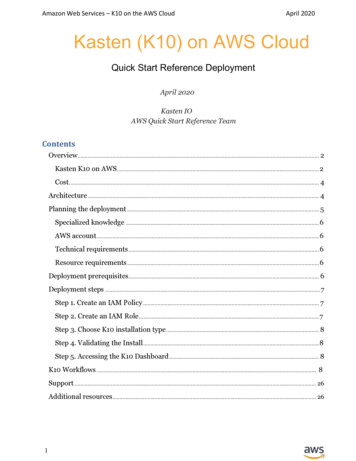
![Index [beckassets.blob.core.windows ]](/img/66/30639857-1119689333-14.jpg)
